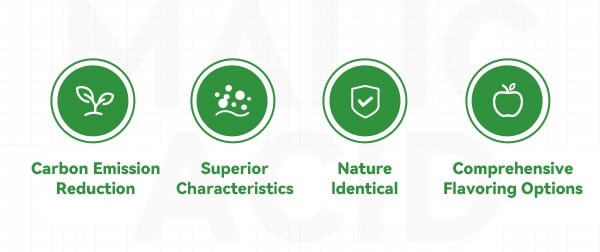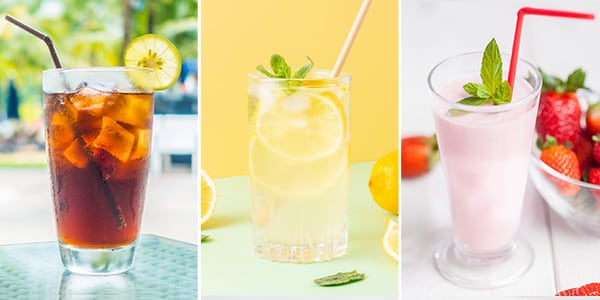In today’s world, health and life sciences have become focal points of public attention.
Consumer demand for health and sustainability in food and beverages is continuously rising, impacting every aspect of the beverage industry. With increasing environmental awareness and a heightened focus on personal health, consumers are leaning towards products that are not only beneficial for their wellbeing but environmentally friendly, too.
They no longer only seek ‘delicious’ flavors but consider the health and functional benefits of their beverages. This shift in demand is forcing beverage companies to reevaluate their production methods, supply chain management, and product innovation. However, rising raw material costs, increased labor expenses, and intense market competition are driving up beverage prices.
Finding a balance between taste, health, cost, and natural ingredients to create a market-leading product has become a significant challenge for beverage companies. At the same time, advancements in the life sciences, particularly breakthroughs in biotechnology, are bringing new opportunities for sustainability in the beverage industry.
By utilizing bio-based raw materials, precision fermentation, and cell culture technologies, the industry can produce more eco-friendly ingredients. These new methods save more water, land, and energy compared to traditional production processes. Synthetic biology, a field with tremendous potential, employs biotechnology to provide consumers with healthier and more environmentally friendly food ingredients.
This is crucial in a world with a growing population and decreasing arable land. We need a revolution in the food industry, finding alternative production methods. However, using complex biological systems to produce green food ingredients remains a significant challenge for synthetic biology.
Innovation in healthy beverage ingredients
Against this backdrop, Anhui Huaheng Biology Company Ltd. (AHB) offers innovative solutions for the beverage industry through its new brand, Bioscentis. Utilizing synthetic biology, Bioscentis introduces a range of healthy ingredients, including Bioscentis MA (bio-based L-malic acid).
Bioscentis MA, is effectively addressing public concerns with its four major advantages: carbon emission reduction, nature identical, superior characteristics, and comprehensive flavoring options. It balances both health and taste preferences, meeting dual demands of consumers.
Bioscentis MA is the flagship product under the brand Bioscentis, newly launched by AHB’s Functional Food and Nutrition Business Unit. The ‘bio’ in its name represents biotechnology and natural ecology, ‘scent’ reflects the brand’s focus on flavor; and ‘-tis’ from the Latin meaning innovation, shows the brand’s continuous pursuit of breakthroughs. Bioscentis represents AHB’s commitment to leveraging synthetic biology to provide consumers with optimal nutrition and health solutions, and to continuously improve people’s quality of life.
Health benefits of Bioscentis MA
In terms of product efficacy, Bioscentis MA offers a soft and long-lasting sour taste, resembling natural fruit juice, and can be widely used in beverages, confectionery, red wine, and baking. It has been approved by international authorities such as Food and Agriculture Organization (WHO/FAO), and The European Food Safety Authority (EFSA) for use in infant products.
It is an organically certified product additive approved by United States Department of Agriculture’s (USDA) National Organic Program (NOP). Additionally, relevant data shows that L-malic acid can promote energy metabolism, facilitate amino acid absorption, and prevent fat accumulation, showing broad application prospects.1
In terms of product development, Bioscentis MA is made from corn, a renewable resource, and uses 100% green electricity in the production process. AHB’s production methods fully substitute fossil fuels required in heating, gas supply, and other areas with renewable biomass.
This reduces CO2 emissions by 0.33 tons per ton of Bioscentis MA produced and aligns with the green and low-carbon environmental protection trend. The L-malic acid produced by this innovative process also has characteristics of uniform size, good fluidity, low humidity, and resistance to caking, making it favored by downstream manufacturers.

Versatility in beverage applications
Bioscentis MA is widely used in the beverage industry due to its soft palate feel and high acidity, which is 1.2 times that of citric acid. Its lingering sourness allows it to combine with citric acid to mimic the tartness characteristic of natural fruits – making the taste more natural, harmonious, and full-bodied. In carbonated drinks, the use of L-malic acid can make the beverage more refreshing.
When used in fruit juice beverages, Bioscentis MA enhances the juice flavor and aroma, while improving any potential bitterness – bringing the taste closer to that of natural juice and delivering a refreshing experience. In fermented milk drinks, Bioscentis MA works synergistically with lactic acid to mask sourness, and instead give a gentle and rich mouthfeel, promoting the release of natural fermentation aromas and enhancing overall flavor.
For sugar-free fruit tea beverages, the combination of tea-based flavors and sweeteners can easily lead to an imbalance in taste. In such cases, the addition of Bioscentis MA can enhance the natural flavors of the fruits and tea leaves in the fruit tea, while balancing and enriching the overall flavor, avoiding the disharmony that can arise from the use of sweeteners alone.

AHB’s commitment to green innovation and sustainable development
AHB actively promotes green production transformation and advocates for green consumption. Bioscentis MA is an important achievement under its Triple Zero strategy, which aims to achieve zero carbon, zero emissions and zero petrochemical energy. It vigorously accelerates and implements zero-carbon production technology, circular economy, and renewable energy projects – driving the industry toward a future of recyclable, integrated, and sustainable development.
Looking ahead, as people increasingly value health and environmental protection, plant sources will become a major trend in food innovation. AHB will continue to innovate as the industry changes, leading the market with green products like Bioscentis MA to offer consumers more delicious and healthy food choices, and advance towards a zero-carbon future.
References
1. Liu J., Jiang L.; Zhao X.; Li P.; et al. (2003). Research and Application on L-Malic Acid. China Food Addit. 3 53–56.


